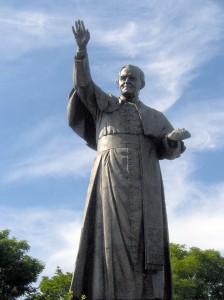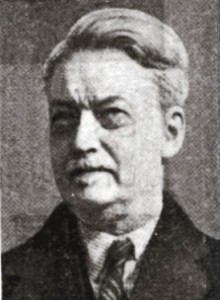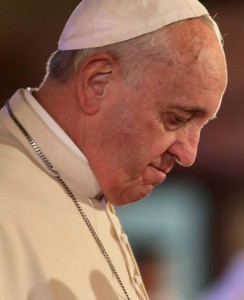On the plane from Paraguay last week, Pope Francis seemed to ask for dialogue with Americans on points he might address during his visit here in September. Following a question from a journalist about reaction to his recent remarks on economics, the pope said, “I heard that there were some criticisms from the United States. I heard about it but I haven’t read about it, I haven’t had the time to study this well, because every criticism must be received, studied, and then dialogue must ensue.”
Before presuming to offer an American layman’s suggestions, perhaps it would be more fruitful to suggest another look at something Francis already knows, namely, some points of originality in the social doctrine of the Church put forth by Pope John Paul II, who himself offered shrewd critical advice (and warnings) well received in the U.S.
Like Francis, John Paul II saw that the ecology of a virtuous economic system requires both the rule of law as well as sound moral habits in its practitioners. In other words, no economy lives by itself, but rather always also by the free and law-abiding political system in which it situated, and by the habits, virtues, and far-seeing associations which contribute to the quality of its civil society. A free society needs to enjoy “ordered liberty” of all three kinds: moral/cultural, political, and economic.
John Paul II showed originality in developing at least twelve new ideas in Catholic social thought:

(1) He shifted the fundamental paradigm for helping the poor from “liberation theology” to “creation theology.” The problem with the former is that it blames others for one’s own poverty, while the advantage of the latter is that it focuses on the creativity endowed in each human person (e.g. Laborem Exercens, 4, 25, 27).
(2) He recognized economic initiative as a fundamental human right (e.g. Sollicitudo Rei Socialis, 15).
(3) He identified the main causeof the wealth of nations as knowledge, know-how, invention, economic initiative, creativity (e.g. Centisimus Annus, 32).
(4) He stressed the subjectivity of each human person as a major principle of Catholic social thought. By this the pope meant the ability of each person to give direction and creativity to his own life (e.g. Sollicitudo Rei Socialis, 15).
(5) He also stressed the subjectivity of society, the way in which each culture is unique in its grounding symbols, stories, and moral character (e.g. Centesimus Annus, 13, 46).
(6) The pope who grew up under Nazism and Communism recommended that the Catholic world think of economics only within the constraints of the rule of law and a reliable legal order (e.g. Centesimus Annus, 40, 48).
(7) Moreover, he saw that economics and politics must also be undergirded by a culture of virtue and upward striving (e.g. Centesimus Annus, 42).
(8) The pope recognized the crucial role, beyond the distribution of the Earth’s goods to all persons, of bringing all peoples within the “sphere of economic and human development,” so that all may benefit from the creation of new wealth by invention and discovery (e.g. Centesimus Annus, 58).
(9) John Paul II recognized, as Francis has as well, that business is a critical institution for raising the poor out of poverty. It is a noble vocation and a necessary instrument for creating new jobs for the excluded poor. Better by far jobs than welfare payments from the state (e.g. Centesimus Annus, 32, 35, 48).
(10) Following Leo XIII, John Paul II emphasized the role of civil society and private associations, rather than the totalitarian or authoritarian state, in lifting up the poor. He also appreciated the numerous personal virtues required for this task (e.g. Centesimus Annus, 30).
(11) From personal experience, the pope grasped clearly the dangers of a too-powerful and domineering state which attempts to provide for everybody. Implied in his remarks is that total dependency on the state is corrupting morally, economically, and politically (e.g. Centesimus Annus, 48).
(12) He also saw advantages in aligning the self-interest of individual citizens with the common good, so that they might appreciate the expansion of the common good as also in their own interest (e.g. Centesimus Annus, 35, 51).
These principles are quite closely interdependent. Each seems to double-back on one or more of the others. What seems like repetition in their enunciation springs from their interrelation.
* * *
One might call this body of St. John Paul II’s thought “economic personalism,” for it all springs from reflection on the marvelous capacities of the human person, made in the image of our Creator, freely able to consider the past, to choose, and to create a new future for himself or herself.
With this perspective, Christians need to think more clearly about population growth. Pessimists fret that each new child means one more mouth to feed and is thus nothing but a drag on human development. But economic personalism appreciates that each child born has the potential during her lifetime to create more wealth than she consumes.
As John Paul II made clear, economic growth is not an end in itself, but it does make possible the discovery of new products and technologies, the good use of which may create legions of new jobs. Society is not subservient to economic growth, but economic growth does promote human development (cf. Centesimus Annus, 49).
Our saintly pope grasped that the more a society is open to human initiative, invention, and discovery, the more its members, made in the image of God, can participate in their vocation to be creators of new goods in service to the poorest among us.
The great possibility for our generation is to lift out of poverty every poor man and woman on this globe. In the future, the poor ought to enjoy ever-higher standards of living. Mathusian pessimists have been proven wrong, while those like St. John Paul II, moved by hope and respect for human and divine creativity, have so far been correct.











